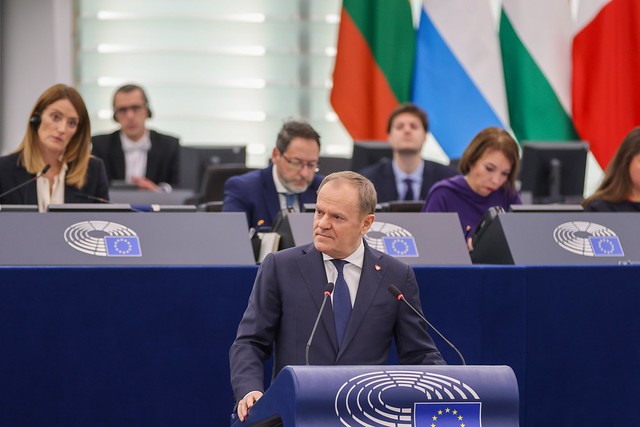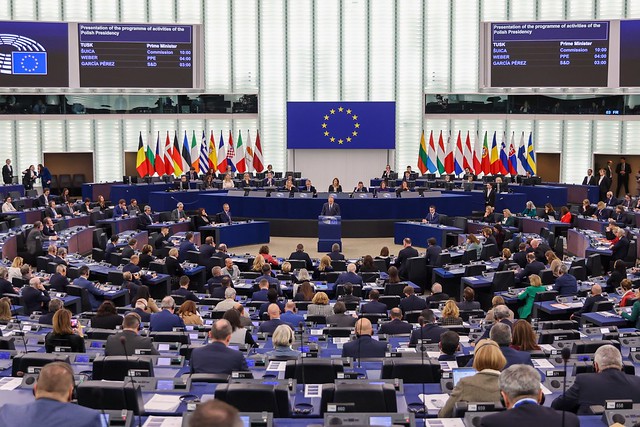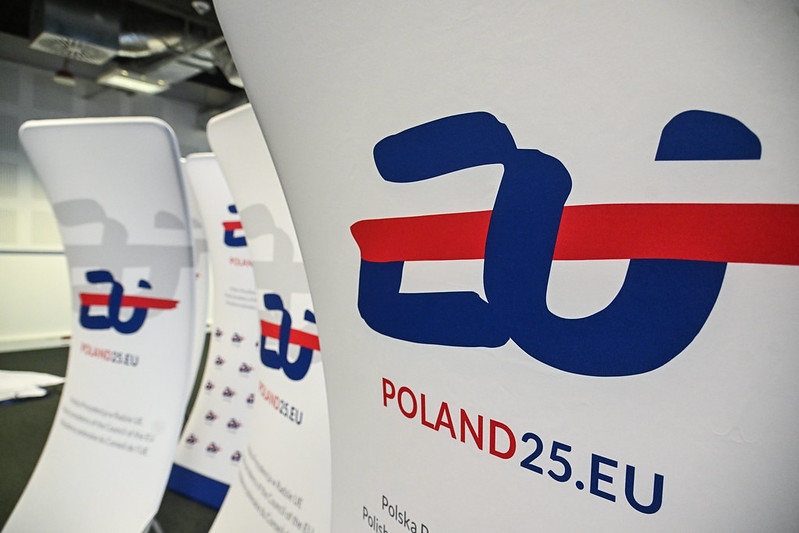Donald Tusk outlined in the European Parliament his goals for Poland’s EU Presidency and the country’s “Security, Europe!” strategy. The Polish prime minister’s speech received some warm applause for his stance on defence – but criticism quickly emerged over his attack on the Green Deal and his migration track record.


In a debate in the Strasbourg hemicycle, Donald Tusk said security is a key priority for Europe because of a hot conflict on its borders, political change in the US and the challenge posed by weaponised lies and disinformation online. He stressed that spending up to 5% of GDP on security and defence is necessary, and warned Europe needs to arm itself to survive: “Do not ask America what they can do for our security, ask yourselves what we can do for our security,” he stressed.
Mr. Tusk told MEPs that the Polish Presidency wants to minimise the threat of illegal migration, as Europe’s leaders have a responsibility to keep its borders and territory safe. But he insisted this could be done without nationalistic and xenophobic slogans. He also referenced EU enlargement and Ukraine’s accession as goals for the future.
Curbing energy prices and energy dependence on third countries, especially Russia, is another priority for Poland, and Donald Tusk said a review of legislation, including under the Green Deal, was necessary to make sure EU citizens have access to cheaper energy. “We need to protect our climate but we cannot afford not to be competitive,” he said.
As for MEPs’ interventions, Socialists and Democrats (S&D) condemned Tusk’s migration policy, which focuses primarily on border security. “We strongly oppose this regressive approach to migration, which is biased towards the security side instead of striking a fair balance between shared responsibility and solidarity with those fleeing from despair,” Juan Fernando López Aguilar, a Spanish Socialist MEP said.
Another contentious issue in Donald Tusk’s speech was the Green Deal with some MEPs reacting negatively to his call for a “full and very critical review” of the pro-environment laws. “Tusk’s line, which is also the European People’s Party line, actually takes a step back on the Green Deal. While for us it is necessary to fight energy poverty [as Tusk claimed], at the same time it is necessary to give a greater input to the Green Deal,” Italian MEP Danilo Della Valle from The Left group commented.
The Presidency’s programme is committed to taking decisive actions in the following priority areas:
Enhancing defense capabilities and readiness: This includes the development of a robust European defense industry, benefiting entities of all sizes and contributing to collective security to respond to both conventional and asymmetric threats.
Safeguarding and promoting the EU’s core values: The Presidency incorporates measures to strengthen civil society, promote civic education, enhance crisis preparedness, and support independent media to combat foreign interference, disinformation, and hybrid threats. These efforts are essential to fortifying the resilience of European democracies.
Ensuring long-term budget: The Presidency will intensify discussions on the next Multiannual Financial Framework and accelerate the debate on the post-2027 cohesion policy. The discussions will be critical in ensuring that the EU’s budgetary priorities align with its long-term strategic goals, including economic recovery, sustainable development, and regional cohesion.
Strengthening energy security: A stable supply of energy resources is a key priority to facilitate the EU’s transition to a more sustainable, technologically driven energy system.
Common Agricultural Policy: The Presidency advocates for a policy that supports food security, rural development, and encourages farmers to adopt environmentally sustainable practices.
Focusing on climate change: In the light of the increasing frequency of natural disasters, the Presidency will prioritise the development of a comprehensive climate adaptation plan for the EU to mitigate the impacts of extreme weather events.
Employment and social issues: The focus is on three key areas: 1. Advancing Digital Europe, including initiatives to regulate the use of Artificial Intelligence, promoting digital skills acquisition, and ensuring that all citizens benefit from the digital transition. 2. Equality, cohesion, and inclusion, with special attention to vulnerable groups, the social economy, and measures to ensure equal treatment in the labor market. 3. Addressing challenges posed by an ageing population, safeguarding the fundamental rights of the elderly, improving access to high-quality long-term care, and reviewing EU recommendations on affordable care services.
Placing youth at the center: The Presidency is committed to creating a safe and prosperous Europe for future generations. To this end, it will facilitate high-level discussions on the governance of the European Youth Dialogue and develop a comprehensive communication strategy to engage young people in shaping the future of Europe. These efforts reflect the Presidency’s dedication to ensuring that the voices of young Europeans are heard in the EU’s decision-making process.
The detailed Polish presidency programme is available here.
